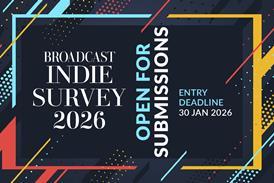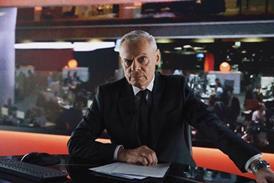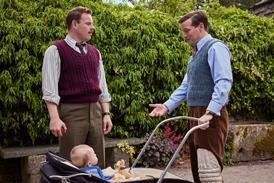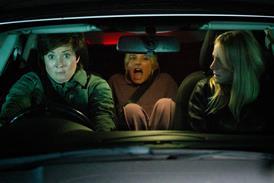The self-shooter
Philip Reay-Smith is a staff reporter for ITV News. He has recently been trained internally in how to use cameras to self-shoot reports from major national and international events.
'I've been with ITV Newsfor the past five years, although I only began using a camera myself a year ago. I set out to get a different perspective on last year's general election when I started to take a camera to various political events to demonstrate how staged they are - not something you could easily do accompanied by a full crew.
'Since then I've taken a camera among protestors at the G8 summit to record events from their point of view, and I also went to California to report on fans waiting for the outcome of the Michael Jackson trial.
'To begin with I used a PD 150-type mid-sized camera - professional but easy to operate - and for the first few months I was self-trained. But while my bosses liked what I was doing it was clear there was room for some technical improvement. So they sent me on two training sessions designed to improve my camerawork.
'I had two one-to-one sessions with ITN's main training instructor, Greig Cubitt, an ITN staffer responsible for training cameramen for ITV News. Each session lasted a day. This showed me how to do the fiddly bits like gain and wide balancing - the things you don't know as an amateur camcorder user - and how to avoid 'shaky cam'. While this style of reporting is closer to a video diary, there is a balance to be struck - you don't want the viewer to end up feeling seasick.
'Each day began in the training room, then we wandered the streets putting theory into practice. I was trained on the next generation Sony Z1 which has high-definition capability and is slightly bigger and more professional than the PD 150. It was informal, but the one-on-one support was of great value.
'I'm fairly unusual. Only one or two other reporters here have used cameras in this way. But my bosses like the distinctive style of reporting self-shooting delivers, which has allowed me to take on stories I would not previously have done.
'In early June, for example, I will be travelling with England fans in a camper van to Germany for the World Cup. Clearly, this is not something you'd be able to do with a conventional news crew in tow.'
The TV scriptwriter
TV scriptwriter Debbie Owen was recently selected by scriptwriting training providers TAPS to undertake Full Length Script Development.
'Five years ago when I was 30 I gave myself until I was 35 to become a TV writer. Although I worked for a nursing agency in Derby, and still do, I'd always written. So the first thing I did was contact the writer Lucy Gannon via the Derby Playhouse. I sent her a piece of work, she appraised it and offered advice. I then enrolled for the MA at De Montfort.
'During my MA we were encouraged to select a mentor from a list of guest speakers involved in the course. I chose Ruth Caleb and she anonymously sent a shadow Casualtyscript that I had written to TAPS. You can't just pay to get on to a TAPS course, you have to be selected, and I was one of the six people chosen for the latest course which kicked off in Leeds last November.
'The TAPS course began with a weekend of workshops. Each of us arrived with a one-hour script and was assigned a script consultant. Mine was Di Culverhouse (of literary agency Culverhouse and James). We were then expected to turn our script into a polished, 30-minute final script, which would then actually be produced. I was assigned a producer, Ruth [Caleb], and a director [Keith Washington], who shortly after the workshops cast my script which was then shot in London over a weekend in early March. It was a quick process, and the result is a rehearsal piece which will soon be shown with the other five participants' films to a selection of industry professionals. A DVD will then be distributed further afield.
'Doing the course has given me access to a network of prospective employers. It has also given my own scripts more weight. It has undoubtedly opened doors, and I'm far more confident as a result. If a production company is going to invest in me I have to prove myself: TAPS demonstrates someone has already been prepared to take that risk.
'TAPS will track us for a further two years. Ruth and Di are still in regular contact, and Keith says he wants to stay in touch as well. I've just applied for John Yorke's writers' academy. And I'm currently working on a trial script for Hollyoaks. All in all it's been a fantastic opportunity.'
TAPS' Full Length Script Development course costs £600+VAT per person, which includes subsidy from Skillset. Participants can apply to their Regional Screen Agency for assistance with fees. A contribution towards travel and accommodation costs is available
The self-editor
John O'Mahony is one of 12 London-based directors working on BBC2's The Culture Show. He recently undertook a two-day course to use Apple's Final Cut Pro desktop editing system taught by Apple-certified freelance trainer Richard Atherton. The course is run by BBC training & development.
'I've worked as a director on The Culture Showsince February 2005 and have done a number of different training courses in this time, including various camera skills workshops.
'Before joining The Culture ShowI had done a little editing myself. Last summer I did half the edit on a documentary I had made for an independent producer, but I'd not been formally trained: I taught myself from a manual. The basics of editing are relatively straightforward. I'd used Premier (an Adobe video editing package) before and found it was perfectly usable, although it was at times a bit flaky and crashed a lot. So when I heard the department was running in-house courses in Final Cut Pro I put myself forward.
'The course ran for two days just before Christmas and took place at the BBC in White City. We were taken through the basics of the Final Cut Pro programme during the first day. Then, on day two, the focus switched to more complex applications such as key matting and manipulating the way it handles time, fast and slow motion.
'I've since found my knowledge of Final Cut Pro very useful. It means I can add to the time I can give to an edit, which is significant as we work on such a tight turnaround, and I can cut the costs involved by self-editing the early stages before working with an editor to finish off.
'I can now extend a two-day edit into three by self-editing two days, or a three-day edit into four. It's a better use of resources as in any edit the early stages involve things you can easily do yourself such as logging viewing tapes, rough cuts and trying stuff out.
' The Culture Showis made by two teams, one in London and the other in Glasgow. Around half of the show's directors have now done Final Cut Pro training. However, I don't myself replace editors who have spent four years at film school. I absolutely value the editor's role and will continue to do so. And because of this I feel my editing skills are now as useful as I need them to be.'
The runner
Will Nelson of post- production house DGP was one of 23 graduates of Skillset and trade body UK Post's First Post training scheme for runners. The aim of the initiative is to formalise training within post-production by actively supporting an entrant's development.
'I joined DGP as a runner from university in December 2004. I'd studied cinematics, a practical and theoretical film course, at the University of East London. Rowan (Bray, general manager of DGP) circulated details of a new course for people with under a year's experience in the industry.
'The course was outlined as an introduction to the technology and the client side of the business. As I'd not been working in the industry long I wasn't sure which direction I wanted to go in, and it was very useful as it provided both a comprehensive introduction to the post industry and specific information relating to different skills.
'The course ran for 18 days over a period of five months and involved day release. This meant doing my normal job in the morning, then attending training between 1pm and 9pm. For the second course, which is now underway, they've altered the timing so people participate for 14 full days over 12 weeks.
'The training took place in Kingsway College off Berwick Street - which was handy as it's a stone's throw from most post houses in Soho. It touched on every aspect of the industry. The tutors were people currently working at senior levels within the business. Then, halfway through, we had the chance to break out into a specific area. I chose technical. This involved a degree of practical training, regular visits to facilities - including Framestore and The London Studios - and weekly assignments.
'We had some access to kit such as Avid and audio equipment, although inevitably there was only so far the course could go. I would have liked it to have been more hands-on, but the obvious difficulty is finding facilities not already in use on clients' work.
'My boss, Rowan, was my mentor throughout the duration of the course and we had a verbal agreement from the outset that once I had completed the course I would remain with DGP for at least another three months, which seemed perfectly reasonable to me as it was their investment.
'A week after the end of the course I was promoted to be an assistant in DGP's Expresso department which handles fast turnaround DVD production. I'm not sure whether doing the course directly led to this promotion, but it has certainly deepened my understanding of the industry, and I am very pleased with what is a big step-up in an area that's a fast-growing part of DGP's business.'
First Post is the first subsidised training scheme for graduate runners working in post-production. Participants are nominated - and paid for - by their employers. The course costs £5,000 per head with employers contributing, on average, £900. The balance is covered by government funding
The long-distance learner
Sam Bailey, a producer for BBC Jam (formerly known as the Digital Curriculum) will shortly start Bournemouth Media School's new online MA. It involves putting his own training programme together and it is open to media business professionals from any discipline.
'My undergraduate degree, which I studied at Bournemouth Media School, was an interactive media production course. But although I've been working in my current staff role at the BBC for the past 18 months, I still feel there's a tendency for people with vocational degrees like mine to be perceived as lower down the food chain by more traditional Oxbridge types.
'An MA, however, gives you the opportunity to wear a badge that says you are a thinker as well as a doer. And thinking skills will be increasingly important as I move up the career ladder towards senior producer level, and then on to editor.
'The Bournemouth MA programme is designed around the idea that participants will focus on
current 'live' projects for their dissertation, research and final exhibition. My job is to create innovative and engaging learning content - not for schools but for kids themselves to be able to use without adult support. We're doing a lot of innovative stuff which I'm sure will tie in well with the MA.
'The Bournemouth MA runs for 15 months part-time and online. The idea is that you focus on a single project - something you are currently working on - and write it up and research around it. My focus will be innovative techniques in distance learning for children - more of a doctorate approach than is the case with a traditional media MA.
'There will be weekly online tutorials and regular online peer discussions. The course places a big emphasis on peer evaluation, and specialists in different areas will also contribute towards the final assessment. All of this is very different to existing media MA courses run by other colleges which are typically conversion courses for people who come from other industries, and tend to be far broader in scope.
'Studying online will be fine, it's how I work anyway: I'm currently working with a development company in Barcelona. A big issue will be confidentiality, however. 'As my current project will be the focus of my MA I will have to work closely with my boss at the BBC to discuss what can and cannot be written up and disclosed. But the BBC is supporting me to do this course (although I'm paying for the course myself) and, as I want a long-term career there, then the corporation's best interests have to be my best interests too.
The Bournemouth Media School's online MA programme begins in October 2006 and can be undertaken alongside any media-related discipline. It costs £5,000 per head

























No comments yet